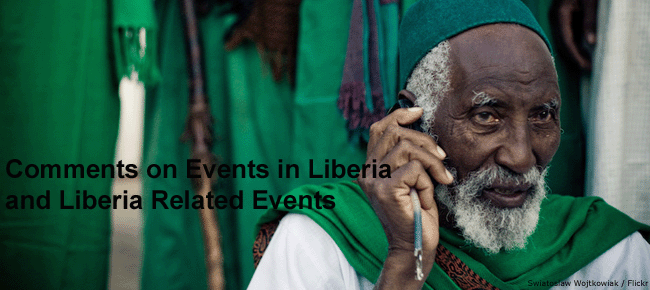Sunday, November 21
Presidential elections in Nigeria and Liberia: the stakes and the contenders
The October 1 Abuja bombings and the catch of heavy weapons, artillary rockets and mortars, and ammunition in Lagos in the same month may be related to an international gang of drug traffickers or to Nigerian militants of MEND, the Movement for the Emancipation of the Niger Delta - or they may be inspired by the forthcoming National and State elections. In any case, it seems increasingly likely that next year will be a violent one in Africa's most populous country. The stakes are getter higher in Nigeria's 2011 presidential elections: not only national unity and the distribution of the oil revenues amounting to tens of billions US dollars - see my November 14 post - but also regional peace and even Nigeria's ambitions to join the world's top twenty economies by the year 2020. The presidential elections are likely to be accompanied by political instability and north-south clashes.
Over 60 political parties have registered with the Independent National Election Commission (INEC), for the National and State elections, but for the presidential elections the ruling People's Democratic Party (PDP) is the only one that has a nation-wide base, all other parties being based on specific regions or States. The battle for the presidential nomination divides the north and the souyh of the country. Under the unwritten regional power sharing rules of the PDP a President - from the south or the north of the country - may serve two terms. After the southerner Olusegun Obasanjo had served two terms, the northerner Yar'Adua became President but he died before the end of his first term and was succeeded by the Vice President, Jonathan Goodluck who hails from the south. The latter hopes to win the party's nomination for next year's presidential elections but the northerners are convined that it is their turn. Four northerns hope to win the PDP's nomination: General Ibrahim Babangida (aka IBB), former military ruler (1985 - 1993) and one of the wealthiest men in the country; former Vice President Atiku Abubakar; Kwara State Governor Abubakar Bukola Saraki, and former National Security Advisor Lieutenant-General Aliyn Mohammed Gusau. Governor Saraki is with his 49 years the youngest of the four, IBB being the oldest (69), closely folowed by Gusau (67) and Atiku (65). It is hard to tell who will be the consensus candidate from the north but that a consensus candidate will have to be found is certain. If the northerners fail to realize this, Jonathan Goodluck is sure to win the PDP's presidential nomination. What will happen if Jonathan Goodluck does not win his party's nomination is a big question mark, but increased violence is very likely.
In Liberia 72-year old President Ellen Johnson Sirleaf hopes to win a second term. Her party, the Unity Party (UP), successfully merged with the Liberian Action Party (LAP) and the Liberia Unification Party (LUP) which significantly increased her chances to win the presidential elections. However, the outcome of the 2011 presidential elections will depend much on two factors. First, the verdict in the Taylor trial, expected at the end of this year or early 2011. If Charles Taylor would be acquitted by the Special Court for Sierra Leone - which cannot be totally ruled out - everything is likely to change. Secondly, the winner of the power struggle within what is sometimes called 'the coalition of rivals': former footbal star George Weah's Coalition for Democratic Change (CDC) which also includes the Progressive Democratic Party (PDP) of former LURD leader Sekou Damate Conneh, the National Patriotic Party (Taylor's party), and the Liberia National Union of Winston Tubman. George Weah ended second in the 2005 presidential elections and with his 44 years he stands for the candidate of the youth. For the past few years he has studied business administration in the USA to improve his experience and reputation.
Other presidential candidates are Charles Brumskine, a former Taylor ally, who ended third in the 2005 presidential elections, Dew Mayson, academician, businessman and politician who was ambassador to France under President Doe, Varney Sherman, now leader of the New Unity Party after winning an internal struggle from Henry Fahnbulleh, Sherman was fifth in the 2005 elections, and - last but not least - former warlord and Senator for Nimba County, Prince Johnson (see my October 13 post commenting on his candidacy).
Also in Liberia the stakes are high: peace, political stability, national reconciliation, economic recovery and the country's international reputation. Until the elections, peace will more or less be guaranteed by the UN Mission to Liberia; UNMIL may even stay beyond October 2011 which will favorably affect the much needed political stability. However, national and foreign investors will need guarantees to expand investments: political stability, national reconciliation, economic reforms, and less corruption which nowadays is rampant. National reconciliation will have to come from within and Liberia will need leaders who are objective, competent, visionary and - above all - unpartial. The ethnic divide and the still existing cleavage between 'Americo-Liberians' and 'Afro-Liberians' will have to disappear if Liberia is to develop and prosper.
Most if not all presidential contestants - both in Liberia and Nigeria - are silent about their views and strategies to tackle the most important political, economic and social problems of the country of which they aspire to be President. The objectives of the political parties which they represent are largely unknown - if they even exist. In both countries the struggle for the presidency seems to be held between politicians who only seem to be interested in power or money - or both.
2010/11/21
Subscribe to:
Post Comments (Atom)


No comments:
Post a Comment